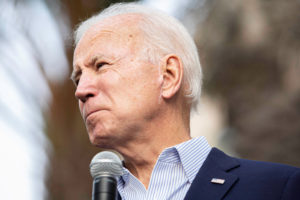Biden’s ‘Inflation Tax’ Targets the Poor and Middle Class

President Biden has repeatedly promised that he won’t raise taxes on American families earning less than $400,000 per year. Yet widespread and growing inflation due to his policies is — at least indirectly — breaking that promise. Call it the Biden inflation tax.
Consumer prices have increased at an accelerated rate every month this year. In April, core inflation rose at its fastest month-over-month pace since 1981. The producer price index grew by the largest amount on record last month. Commodity prices are skyrocketing, with corn rising by more than 50% this year, lumber elevating to four times its traditional rate, and copper hitting a record high.
Average gasoline prices nationwide have risen by about 40% since Biden was elected, exceeding $3 a gallon nationwide. Biden’s longstanding opposition to the Keystone XL pipeline contributed to widespread gas shortages across the Southeast caused by the cyberattack on the Colonial Pipeline. As these input prices filter down to consumer goods, prices will rise even further.
Inflation acts the same way as a tax by reducing the value of earnings. It devastates retirees and those on fixed incomes by making them poorer through no fault of their own. And it hurts small businesses, which must constantly raise prices, reducing sales and alienating customers.
Biden’s historically aggressive fiscal and monetary policies are largely responsible for these developments. His extended federal unemployment benefits pay nearly half of recipients more to stay home than return to work. Lorne Zaman, a former concert promoter in Los Angeles, explains the dynamic: “If the government is going to pay you to stay home, you’re going to do that unless that job you really want comes along.”
As a result, the country is experiencing its biggest labor shortage in at least a generation. The Labor Department revealed last week that there are 8.1 million unfilled jobs nationwide. To find workers, many small businesses are resorting to paying above-market wages and passing the cost on to their customers in the form of higher prices. For instance, The Grainery, a longstanding restaurant in Columbus, Ohio, plans to raise its prices by 25% to cover the increasing cost of labor and supplies.
“We’re like, ‘Just come work here, we’ll pay whatever you need, and we’ll make it work later,'” said Adam Allison, owner of two restaurants in Phoenix. “We obviously can’t do the business if we don’t have the employees. If we need to raise prices on the beer, that’s what we’ll do.”
Biden’s unnecessary round of $1,400 direct checks distributed last month has resulted in an artificial spending spree, with consumers bidding up prices for scarce consumer goods. This demand is occurring at the same time as widespread supply chain shortages for products like computer chips put further pressure on prices.
Milton Friedman said, “Inflation is always and everywhere a monetary phenomenon.” Biden has already passed an unnecessary $2 trillion “rescue” plan and proposed $4 trillion in additional social welfare spending that would amount to the biggest expansion of American government since the 1960s. The Fed is monetizing this debt, dramatically increasing the money supply. Each dollar it prints is weaker than the last, requiring Americans to use more to purchase the same goods.
In contrast to Biden’s proposed tax increases, this inflation tax targets the poor and middle class who are most vulnerable to price increases on daily staples.
The Fed has signaled that it will keep interest rates at zero for the next few years, so inflation is unlikely to slow down. Only when Biden realizes it’s a political vulnerability will he try to act. But inflation genies are traditionally hard to put back in their bottles.
Biden’s presidency is now defined by gas lines, inflation, and dramatic government spending. I’m sorry to say that my prediction that his administration would be a modern-day version of Jimmy Carter’s has aged better than I could have imagined. Unfortunately, Americans don’t need a rerun of that ’70s show.





